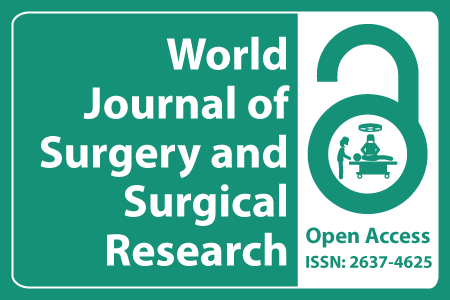
Journal Basic Info
- Impact Factor: 1.989**
- H-Index: 6
- ISSN: 2637-4625
- DOI: 10.25107/2637-4625
Major Scope
- Cardiovascular Surgery
- Endocrine Surgery
- Gastroenterological Surgery
- Minimal Invasive Surgery
- Cardiothoracic Surgery
- Spine Surgery
- Bariatric Surgery
- Neurological Surgery
Abstract
Citation: World J Surg Surg Res. 2022;5(1):1417.DOI: 10.25107/2637-4625.1417
Assessing the Benefit of Adjuvant Chemotherapy in Patients with ER-Negative pT1-2N0M0 Mucinous Breast Carcinoma based on the SEER Database
Liu Y, Jiang H, Zhao Y, Bao L, Wu W, Hao S, Jia Z, Zhang Q and Jiang H
Department of Breast Surgery, General Hospital of Benxi Iron and Steel Industry Group of Liaoning Health Industry Group, China
*Correspondance to: Yongzhi Liu
PDF Full Text Research Article | Open Access
Abstract:
Background: Mucinous Carcinoma (MC) of the breast is often considered to have a better prognosis than Invasive Ductal Carcinoma (IDC). However, the National Comprehensive Cancer Network (NCCN) guidelines for the optimal systemic control of MC are mostly extrapolated from data pertaining to IDC. In this study, we investigated Breast Cancer-Specific Survival (BCSS) in different subtypes of patients with MC and analyzed whether patients with Estrogen Receptor (ER)- negative and pT1-2N0M0 MC should be treated with adjuvant chemotherapy. Methods: Using data from the Surveillance, Epidemiology and End Results (SEER) cancer database (2000-2009), we analyzed the relative and absolute hazard ratios of the cumulative 10-year BCSS rate of 10,772 female operable breast cancer patients with MC, stratified by age, race, tumor size, ER status, histological grade, lymph node status, adjuvant chemotherapy and adjuvant radiotherapy. Results: The rate of ER negativity was 2.7% in the MC patients. MC showed less aggressive behavior and had a better prognosis regardless of the patients’ ER status, and this favorable outcome was maintained after 10 years. The univariate analyses and multivariate analysis consistently showed that ER positivity was an advantageous factor affecting the BCSS rate in the MC patients (HR=0.48, 95% CI: 0.34-0.67, p<0.001 and HR=0.62, 95% CI: 0.44-0.87, p=0.006, respectively). In the patients with lymph node-negative disease, the 10-year BCSS rates were 91% and 88% in those with ERpositive and ER-negative MC, respectively. Specifically, among the patients with ER-negative pT1- 2N0M0 MC, there was a significant difference in the 10-year BCSS rates between the patients who did not receive adjuvant chemotherapy and those who received adjuvant chemotherapy (92% vs. 81%, adjusted HR=3.02, 95% CI: 1.13-8.06, p=0.028). Conclusion: MC histology type was a favorable factor affecting survival. No overwhelming evidence supports the significant benefit of adjuvant chemotherapy in patients with ER-negative and pT1- 2N0M0 MC.
Keywords:
Breast cancer; Mucinous adenocarcinoma; Estrogen receptor; Survival analysis; Chemotherapy
Cite the Article:
Liu Y, Jiang H, Zhao Y, Bao L, Wu W, Hao S, et al. Assessing the Benefit of Adjuvant Chemotherapy in Patients with ER-Negative pT1-2N0M0 Mucinous Breast Carcinoma based on the SEER Database. World J Surg Surgical Res. 2022; 5: 1417..













